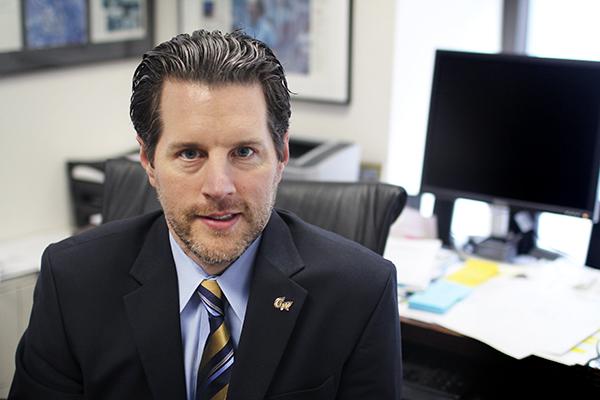The University Counseling Center doesn’t have unlimited resources, but officials have continued to prioritize mental health by making the most out of what they have.
After a year-long conversation about whether to make counseling sessions free, officials are instead stretching UCC’s budget to support students in as many ways as they can. As more students use mental health services on campus, officials are aiming to reach a variety of students in more cost-effective ways by hiring both specialists and general counselors, and potentially adding more group counseling sessions, Dean of Student Affairs Peter Konwerski said.
“We’re looking at the comprehensive nature of the model and trying to find ways to maximize the services we deliver,” Konwerski said. “We know that there’s more conversation about mental health. So, how do we continue to deliver [on] mental health that is stretching the dollar, stretching the resources, stretching the time?”
Konwerski said because UCC is more visible now that it has moved to campus, more students are taking advantage of the six free one-on-one clinician sessions, group counseling options and drop-in hours available there.
“If you build it, they will come,” Konwerski said. “Part of our funding was to hire more psychiatrists, and after we hired more psychiatrists, we are seeing more students.”
Konwerski said this kind of strategic hiring was the best option for UCC, rather simply than offering additional free sessions, because most students do not use all six free sessions they are currently offered each semester. He said that though students have called for more free sessions, adding that option wouldn’t necessarily meet all of their needs.
“There are people who don’t just need one-on-one counseling, or they don’t need an hour. So I think the student mindset is, ‘I only have six free and six more sessions,” when the reality is they don’t all need six and they don’t all need 12,” Konwerski said.
Micky Sharma, the director of counseling at the Ohio State University, said said the answer for best utilizing counseling resources is not always hiring more clinicians, but rather increasing the ways students can access them and increasing preventative programming.
“Just because a student is crying doesn’t mean they need psychotherapy. Sometimes it’s about having workshops, programs, other techniques with better skills and mechanisms in students’ hands before they get to the point of needing a clinician,” Sharma said.
Supplementing through specialization
This semester, the center has hired five specialized clinicians who can cater to certain populations like medical and nursing students, and two more general clinicians will be hired this summer for a total of 16 full-time clinicians in addition to clinical fellows, interns and a case manager. A portion of next fall’s 3.4 percent tuition increase will also go toward mental health services, a signal of the officials’ overall commitment.
Silvio Weisner, the director of UCC, said all staff members are trained to work with a mix of students and each counselor coordinates services specifically for students who historically under-utilize or lack access to counseling services, like LGBT students and graduate students.
“The role of these coordinators is not to see every student who fits into that specific category, but rather to serve as a point person for these concerns and/or populations,” Weisner said in an email.
He added that specially-trained clinicians work with those other staff members on training or policy development and create outreach activities to connect with students.
Josh Gunn, the former president of the American College Counseling Association and the executive counseling director at Kennesaw State University, said a staff of specialized and general clinicians is especially helpful on college campuses. He said having generalists on hand is important because they can have experience in a lot of areas, making them best equipped to work with a wide variety of issues.
“College counselors have to be some of the world’s best generalists, as the diversity of student problems that walk through the door is incredible,” Gunn said.
Gunn said specialists may know how to better treat students with specific mental health issues, like eating disorders, or they may know how to better lead group counseling sessions or conduct psychological testing. GW hired an eating disorder specialist last year.
“As it is in medicine, there are certain problems that are either more severe, complex or treatment-resistant that require someone with additional expertise in treating that disorder,” Gunn said.
More options for group counseling
Konwerski said UCC has looked to further its group session options, both by changing up the format of the sessions and adding more groups to cover different areas of mental health. Officials pick the session topics based on need and student requests, so the focus areas could evolve over time.
UCC introduced a group focused on academic success and study skills this semester where clinicians teach students skills on how to balance school work with life outside of the classroom. Konwerski said the group was formatted like a “mini class” with tips about working with professors and preparing for exams.
This year, UCC offered nine group counseling sessions for certain student populations. Weisner said the counseling center piloted two new four-week anxiety management groups, in addition to other specific groups including one for female sexual assault survivors and another for students with eating disorders.
“MHS is always considering additional care and support options for students beyond the more traditional individual and group counseling it already provides,” Weisner said.
Weisner said these types of groups will help respond to targeted students as well as prevent them from needing one-on-one counseling later.
Center for Student Engagement Director Tim Miller said in an interview that adding more general specialists could help officials come up with new group counseling sessions in the future as they bring in new ideas.
“They are able to think about, ‘We’ve never done a group like this. Maybe this is worth doing,'” Miller said. “The key is you have different people asking different questions that haven’t been asked before.”
Colleen Murphy and Eva Palmer contributed reporting.







